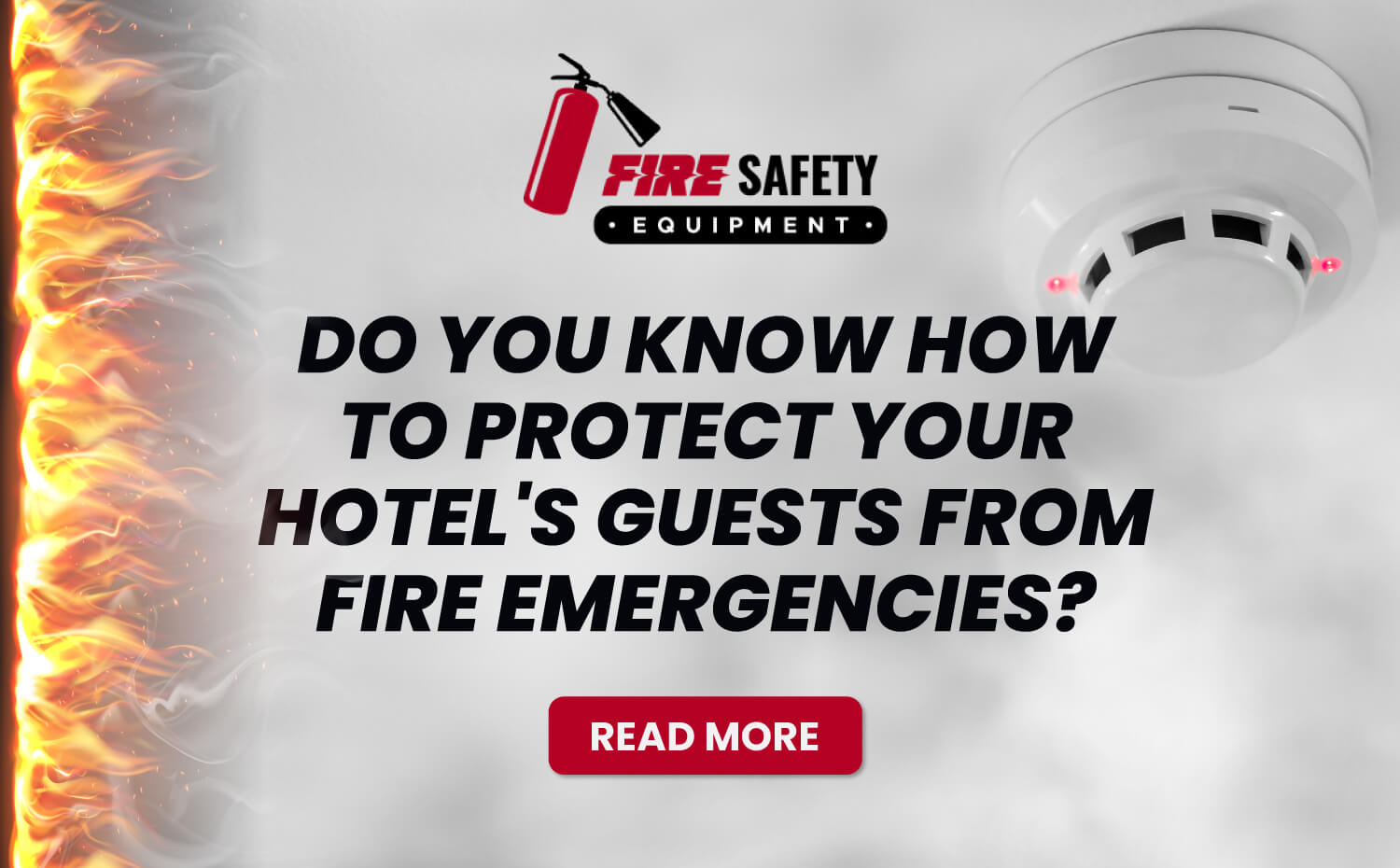Do You Know How to Protect Your Hotel's Guests from Fire Emergencies?
Posted by Fire Safety Equipment on 30th Nov 2022
According to data from the U.S. Fire Administration and FEMA, there are 3,900 fires in hotels each year in the U.S. These tragic incidents result in about 15 deaths, 100 injuries, and a staggering $100 million in property damage.
If there is a fire at your hotel, is your staff ready? And is your hotel code compliant against fire damage and injury to your patrons?
This article covers all the hotel fire safety essentials you need to know, including current codes, best practices, fire safety devices (such as commercial fire extinguishers), and more.
Before You Begin: Know the Codes
IMPORTANT: Fire safety codes can change at any time. Your particular type of facility, or your local or state laws, may also make a difference. ALWAYS check to make sure you are compliant with the most current codes.
Most of the information listed in the subheadings below was code compliant as of the end of 2021, according to the International Code Council (ICC).
For details or questions, visit the ICC's website. Code R is the standard for most hotels, with Code R-1 being transient hotel visitors and R-2 consisting of those staying at hotels for a more extended period.
Here is a roadmap for making your hotel as safe as possible for your staff and visitors according to the most current data we could find.
Part 1: Hotel Fire Prevention
Hotels are often high-traffic areas, and most of the time, the staff needs to learn about their clients personally.
So your smartest move is to put some rules that apply to everyone.
Keep Hallways and Stairwells Clear
NEVER store items in a hallway or on stairwell landings. In addition to being a combustion hazard (if chemical or explosive), these can cause falling accidents. They may also impede people from getting out if there's a fire.
Install Fire-Safe Doors
Self-closing doors are a must for areas such as stairwells. They can help contain a fire.
Most fire safety codes require that hotels have doors that open with just one action. (This door exit is called the "egress.”)
Questions about insulated and non-insulated fire-rated access doors? Ask us!
Post Kitchen Area Rules
According to FEMA, the kitchen is the most common place for a fire to break out in hotels.
Make sure your staff follows common-sense rules:
- NEVER leave a kitchen fire unattended, even briefly.
- Install at least one Class K kitchen fire extinguisher in the kitchen. Make sure the fire extinguisher cabinet is within easy reach.
- Require that all kitchen staff keep long hair tied back or covered.
- Require that cooking staff wear shirts or chef jackets with short sleeves to be safe over an open flame or electric burners.
Keep any flammable materials, including napkins, paper plates, or towels, well away from stovetops.
- Keep chemicals such as cleaning agents well away from stovetops.
- Keep all walking lanes and areas in front of the stove and oven clear of boxes, chairs, and other items that could cause falls near a fire.
Post No Smoking Signs
Most hotels are non-smoking except in certain areas (sometimes on the grounds outside the building).
However, the occasional guest may try to have a cigarette indoors anyway. To help prevent this, CLEARLY place No Smoking signs in hallways and any other communal room or hallway, including the lobby.
Post Fire Escape Route Maps
Have an evacuation plan, and post the map with a CLEAR red line and arrows in every hotel room.
Orient the map so that the person looking at it sees where they must go from where s/he is. (Only try to orient all maps north/south, for instance.)
Use Flame-Resistant Materials
Choose fire-resistant textiles for bedding, couches and chairs, curtains, and other flammable fixtures.
Part 2: In Case of a Hotel Fire
Fires can happen even if your hotel is run cleanly and outfitted per code. In that case, you will want to have all the following.
Install and Inspect Fire Alarms
Place smoke detectors:
- In every sleeping unit.
- In hallways.
- In the kitchen (s).
- In eating areas and other communal areas.
- In staff/employee gathering areas.
Smoke alarms usually indicate when the battery is running low with a repetitive, chirp-like beep. Ensure you replace the batteries, inspect the electrical wiring regularly, and make any necessary repairs. Please don't put this step off; it could save lives.
Install and Inspect Fire Sprinklers
Fire sprinklers are essential in case of fire. Refer to your building code to determine your needed number and location. Have these regularly inspected to be sure they are in working order.
Install and Inspect Fire Extinguishers
Fire extinguishers are a code requirement in hotels and other high-traffic buildings.
Type A, C, and D fire extinguishers must be within 75 feet of hotel occupants. Locate Type B extinguishers within 30-50 feet of occupants. Class K fire extinguishers –– such as those for the kitchen –– must be within 30 feet of a potential hazard.
Need help with which fire extinguisher you need? Check our article here for different types of fire extinguishers. Or call one of our representatives today for fast, friendly service and a free quote.
Post Exit Signs
Make sure you have Exit signs posted at ALL exits. During a fire, guests may become confused and panicked. Seeing the Exit sign is the roadmap to safety for your hotel's occupants.
Remember: you must stay up to date on the codes and requirements of your building. By regularly inspecting fire safety products, keeping areas clear and rules well-defined, and keeping up to date on the safety of your building, you can keep your hotel as safe as possible for everyone.
